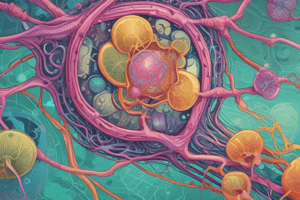Podcast
Questions and Answers
What is the fundamental unit of life in biology?
What is the fundamental unit of life in biology?
- Organism
- Ecosystem
- Cell (correct)
- Population
All organisms can maintain a stable internal environment through homeostasis.
All organisms can maintain a stable internal environment through homeostasis.
True (A)
What is the process by which species change over time?
What is the process by which species change over time?
Evolution
The study of heredity and genes is known as _____
The study of heredity and genes is known as _____
Match the branches of biology with their focus:
Match the branches of biology with their focus:
Which of the following represents the largest biological organization?
Which of the following represents the largest biological organization?
Energy flow in ecosystems is unidirectional and cannot be recycled.
Energy flow in ecosystems is unidirectional and cannot be recycled.
What key concept explains how traits are passed from parents to offspring?
What key concept explains how traits are passed from parents to offspring?
What is one of the main components of the scientific method?
What is one of the main components of the scientific method?
Hypothesis formation is the final step in the scientific method.
Hypothesis formation is the final step in the scientific method.
What does cell theory state?
What does cell theory state?
The process by which species evolve through the natural selection of small, inherited variations is known as _____ theory.
The process by which species evolve through the natural selection of small, inherited variations is known as _____ theory.
Match the following biological concepts with their definitions:
Match the following biological concepts with their definitions:
Which of the following methods is crucial for gathering evidence in biology?
Which of the following methods is crucial for gathering evidence in biology?
Technological advancements do not play a significant role in the study of biology.
Technological advancements do not play a significant role in the study of biology.
Flashcards
What are cells?
What are cells?
The basic unit of life that makes up all living things. They carry out essential functions for the organism.
What is biology?
What is biology?
The study of the natural world and living organisms, encompassing their structure, function, growth, origin, evolution, and distribution.
What is evolution?
What is evolution?
The process by which populations of organisms change over time. It is driven by natural selection and other mechanisms. It explains the unity and diversity of life.
What is homeostasis?
What is homeostasis?
Signup and view all the flashcards
What is structure and function?
What is structure and function?
Signup and view all the flashcards
What is a population?
What is a population?
Signup and view all the flashcards
What is ecology?
What is ecology?
Signup and view all the flashcards
What is botany?
What is botany?
Signup and view all the flashcards
Observation
Observation
Signup and view all the flashcards
Hypothesis
Hypothesis
Signup and view all the flashcards
Experimentation
Experimentation
Signup and view all the flashcards
Data Analysis
Data Analysis
Signup and view all the flashcards
Scientific method
Scientific method
Signup and view all the flashcards
Cell Theory
Cell Theory
Signup and view all the flashcards
Evolutionary Theory
Evolutionary Theory
Signup and view all the flashcards
Study Notes
Introduction to Biology
- Biology is the scientific study of life and living organisms, encompassing their structure, function, growth, origin, evolution, and distribution.
- It's a broad field encompassing many sub-disciplines.
- The study of biology often involves observation, experimentation, and analysis of data, including the use of scientific methods.
Key Themes in Biology
- Cells: The fundamental unit of life. All living things are composed of cells, which carry out various functions. Different types of cells have varied structures.
- Heredity: The transmission of traits from parents to offspring through genes, a key concept in understanding evolution and the diversity of life.
- Evolution: The process by which populations of organisms change over time, driven by natural selection and other mechanisms. This underlies the unity and diversity of life.
- Homeostasis: The ability of organisms to maintain a stable internal environment, critical for survival. This involves various complex processes.
- Structure and Function: The relationship between the physical organization of an organism and its biological functions. Similar structures often serve similar functions, particularly across related species.
- Energy Flow/Transformations: Organisms must acquire and use energy for metabolic processes.
- Interactions within ecosystems: Living things are intertwined and affect one another and their environment.
- Interdependence: Populations of species living together rely on one another.
Biological Systems
- Organisms: Individual living things that are composed of cells. These cells perform complex tasks.
- Populations: A group of individuals of the same species in a particular area.
- Communities: Groups of different populations living in the same area and interacting with each other.
- Ecosystems: Communities of organisms and their physical environment, featuring energy flow, matter cycling, and biotic and abiotic interactions.
Branches of Biology
- Botany: The study of plants.
- Zoology: The study of animals.
- Microbiology: The study of microorganisms.
- Genetics: The study of heredity and genes.
- Ecology: The study of the interactions of organisms with each other and their environment.
- Molecular Biology: Studies the intricate structures and functions of molecules essential to life, such as DNA and proteins.
- Physiology: Studies the function of living organisms.
- Biochemistry: Explores chemical processes within and relating to living organisms.
Methods in Biology
- Observation: The act of noting and recording events or characteristics.
- Hypothesis Formation: Proposed explanations for observed phenomena.
- Experimentation: Tests designed to provide data to support or refute hypotheses.
- Data Analysis: Processing and interpretation of data from observations and experiments to draw conclusions.
- Scientific method: A cyclical process combining all the above, used for generating explanations and testing hypotheses for biological systems.
- Technological advancements: Various tools and techniques, from microscopes to advanced imaging technologies, are critical components in modern biology.
Key Biological Concepts
- Cell theory: All living organisms are composed of cells, and all cells come from pre-existing cells.
- Evolutionary theory: All species of organisms arise and develop through the natural selection of small, inherited variations that increase the individual's ability to survive and reproduce.
- Genetic code: The set of rules by which information encoded in genetic material (genes) guides the process of protein synthesis in living organisms.
Studying That Suits You
Use AI to generate personalized quizzes and flashcards to suit your learning preferences.




